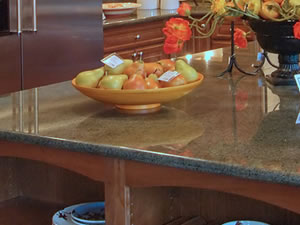Working with natural stone for many years, we’ve become intimately familiar with it –how to care for it, protect it, and resolve problems when they occur. We are always available to answer questions when our customers ask. One of the most common questions we get is, “Now that I have it, how do I take care of it?” For example,
Q. I just moved into a new home with a lot of natural stone – a stunning onyx bar top, gorgeous granite countertops and marble vanity tops in the master bath. I want to keep them looking great. Do you have any tips for me?
A. First, congratulations on your new home! You are fortunate indeed to have the luxury of natural stone throughout your home and you are wise to ask about proper care from the onset. To keep them at their best here are our 5 essential care tips.
1. Seal Your Stone to Prevent Staining
Most natural stone is porous, which means it can absorb staining agents in spilled liquids, dropped food and other substances. To protect against staining, most natural stone countertops should be properly sealed and re-sealed as needed.
TIP: Here’s a great way to test whether your countertops need to be sealed. Pour a bit of water on the most-used areas and let it sit for several minutes before wiping it away. If the area where the water was left a dark spot, this is an indication that the stone absorbed the water, and sealing is needed.
Sealing. DIY or Call in a PRO?
This is possible to do yourself, but you may prefer to have your stone care technician do the sealing to ensure proper coverage and the complete removal of any excess sealer which could dull or mar your stone’s appearance.
2. Clean Only with Proper Stone-Safe Products
For routine cleaning you should use a pH neutral cleaner specifically designated safe for natural stone. And, Heaven forbid, never listen to Aunt Ethel when she tells you to use vinegar and water to clean your stone. In fact, avoid any cleaner that is acidic or abrasive. Even cleaning your natural stone with dish soap and water can create a filmy buildup and possibly even discoloration, depending on the soap’s ingredients. Using glass cleaner can be even worse, as it may eventually dull the polish. By the way, if you are cleaning mirrors above delicate vanity tops, avoid overspray of glass cleaner.
3. Treat Stains As Soon as Possible
Blot spills up immediately. If your stone does become stained, treat it as soon as you can. Download our free Stone and Tile Care Guide. Follow the instructions in it for creating a poultice to break down and draw out the stain.
4. Avoid Damage
Calcite based stone such as your onyx bar top and your marble vanities are sensitive to acidic spills, so always be careful to use coasters under glasses and clean up spills as quickly as possible. On delicate vanity tops, don’t put perfumes and cosmetics directly on the surface but rather use a pretty tray to display them.
Granite is tough, no doubt about it, but take reasonable precautions. Most natural granite can take the heat, but don’t take unnecessary chances. Use trivets under hot pans.
Try to minimize direct sunlight. UV rays on some stone can result in dulled or discolored areas. This is more in the fillers used on some stone than the stone itself. There are protective treatments that can be done, but simply minimizing the direct exposure should be sufficient in most cases.
5. Call for Help When Needed
We recommend that you have a periodic beauty treatment – a clean, polish and seal service – performed on your countertops by your stone restoration technician.
If your natural stone becomes etched, dull, scratched or otherwise damaged, the great thing about it is that it can be repaired, honed, polished, and restored to as good as new in the hands of a qualified stone restoration contractor.
This is one of a series of articles written and published on behalf of Stone and Tile PRO Partners.




